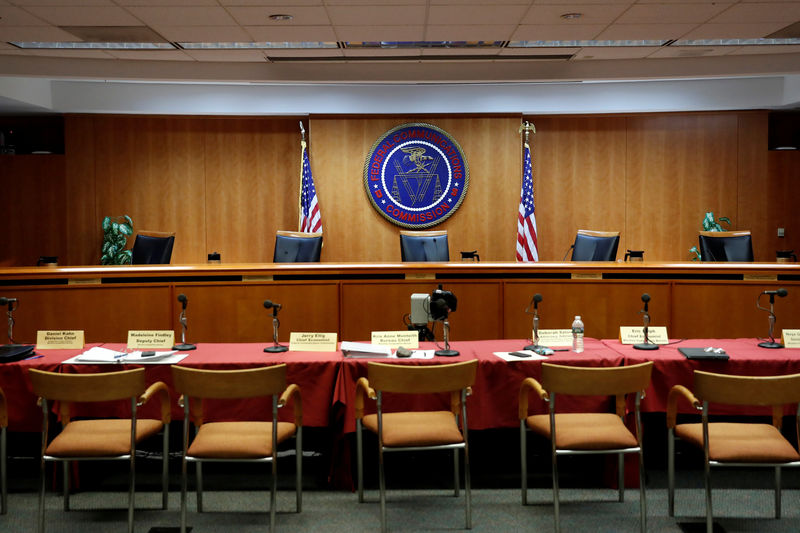By Jeffrey Dastin
SAN FRANCISCO (Reuters) - Behind your video stream of a hit like "Stranger Things" is a complicated array of technology and business relationships that will not change very much, at least in the short term, as a result of this week's repeal of U.S. regulations on internet traffic, industry insiders say.
The U.S. Federal Communications Commission on Thursday repealed its own 2015 rules, known as net neutrality, that required internet service providers like Comcast Corp (O:CMCSA) to treat all online content equally, barring high-speed toll lanes and any preferential treatment of one website over another.
The repeal effort has drawn cheers from Comcast and Verizon Communications Inc (N:VZ), who say the net neutrality regulations stifled investment in their networks. But it has been fiercely denounced by many in the internet industry and beyond as a mortal threat to the open internet, with several state attorneys general and others promising a legal fight.
Yet the loud debate has obscured the fact that the biggest streaming companies, including Netflix Inc (O:NFLX) and Alphabet Inc's (O:GOOGL) YouTube, already pay internet service providers (ISPs) to deliver their videos, while smaller players mostly do not.
The latest net neutrality rules did not erase these business dynamics, people familiar with the arrangements say. The repeal likely will not either, though scuffles could arise as ISPs seek to take advantage of the rule change in the future.
"From the era of having no net neutrality to the era of having it, nothing changed," said a former video streaming executive on condition of anonymity.
To deliver their services effectively and economically, large video streaming companies spend money sending data directly to different broadband networks, and dominant ISPs at times charge for taking on large volumes of traffic.
Big companies like Netflix and Amazon.com Inc (O:AMZN) also can deliver their video streams far and wide on their own, while many smaller internet companies pay external content delivery networks (CDNs) like Akamai Technologies Inc (O:AKAM) to do the work for them. Multimedia websites that do not pay for such services are slower in many instances than those that do.
Companies' "need for someone that sits between their content, whether that's a website or streaming video, and all the places in the world it needs to go, isn't going to change," said Sunil Dhaliwal, founder of venture capital firm Amplify Partners, which has a stake in content delivery network Fastly.
There have been conflicts, notably a 2014 dust-up between Netflix and Comcast, that resulted from the dramatic surge in streaming video traffic in recent years. Netflix ultimately agreed to pay Comcast despite complaining in an online blog post that its partner was "double dipping" by also receiving money from home internet subscribers. Yet this arrangement was not unique.
YouTube, for example, has also paid ISPs as part of so-called "peering" arrangements by which networks connect to one another to deliver video streams more efficiently, said an industry executive familiar with the practice.
In a statement, Netflix said "tolls decreased for us" after the 2015 net neutrality rules were passed - but did not say they disappeared.
The company added: "We support strong net neutrality protections, even if we are at less risk because of our popularity, which keeps our relationships with ISPs stable."
WALKING 'A TIGHTROPE'
Chris Van Noy, a digital media executive formerly with Akamai and streaming service Hulu, noted that ISPs would have no reason to interfere with startups and small firms that send little internet traffic over their networks, with the possible exception of a startup posing a strategic threat.
Going after bigger players would not be simple either, he said.
"It's always a tight rope for the ISPs," said Van Noy. Blocking video services would undermine their sales of fast-download, higher-margin internet plans that are "pure gravy for them."
That is not to say ISPs will not attempt to profit from the regulatory change. They may offer bundled internet deals that include their in-house content but charge extra for Netflix or Hulu, experts said.
"They can frame it as a positive. 'We’re not hurting Netflix. We’re just giving our subscribers a benefit of something we already own,'" said Alan Wolk, lead analyst for TV industry publication TV (R)EV.
But any action that changes how consumers access the internet must be disclosed under the new FCC rules and may face regulatory scrutiny - a possible deterrent.
"I don't think anyone is going to do anything crazy that will upset public opinion," said Eric Hippeau, a managing partner of Lerer Hippeau Ventures and former CEO of The Huffington Post. "This is a highly politically charged area."
